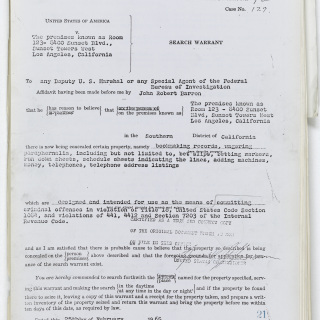The Uninvited Ear 1967
In Katz v. United States, the U.S. Supreme Court overturned its previous rulings and declared that the Fourth Amendment’s guarantee against “unreasonable searches and seizures” also protects individuals from electronic surveillance. The FBI argued that placing a listening device on a pay phone to catch Charles Katz gambling was legal since agents did not physically trespass the booth. The Court disagreed. The justices argued that although Katz was in a public booth, when he closed the door behind him he expected his conversation to be safe from the “uninvited ear.”
The Katz decision modernized the interpretation of the Fourth Amendment by recognizing that “reasonable expectations of privacy may be defeated by electronic as well as physical invasion.”
